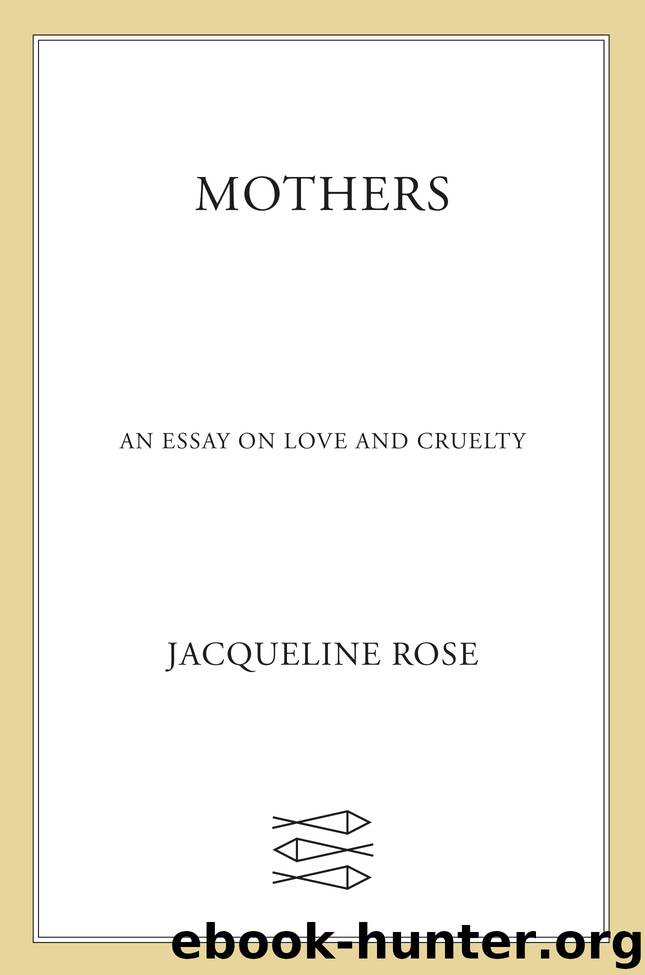Mothers by Jacqueline Rose

Author:Jacqueline Rose
Language: eng
Format: epub
Publisher: Farrar, Straus and Giroux
3
THE AGONY AND THE ECSTASY
ELENA FERRANTE
She is one of the biggest European literary phenomena of the twenty-first century, but Elena Ferrante – by her own account – takes us back to the beginning, the world of the Greeks and Romans, one of the places where we started. ‘I have to say,’ she states in a New York Times interview in 2014, ‘that I’ve never seen the classical world as an ancient world. Instead I feel its closeness.’1 As a young girl, she would imagine the Bay of Naples peopled by sirens who spoke Greek. One of the relatively few pieces of biographical information she has volunteered is that she has a degree in classical literature, from which she learned ‘many things about how to put words together’.2 Medea and Dido are her heroines, the first for walking us into the unthinkable space of infanticide, the second for the civic and intimate generosity with which she set about building the city of Carthage: opening its doors (and her body) to a foreign exile, Aeneas, whatever tragic consequences in the end, and making sure that the temple of Juno, goddess of marriage and childbirth, should display the carnage of war, as a type of memento, on its walls.
Of these two women, Flaubert’s Emma Bovary and Tolstoy’s Anna Karenina are the diminished progeny, because they have lost ‘the obscure force that pushed those heroines of the ancient world to use infanticide or suicide as rebellion or revenge or curse’.3 They have lost the public dimension of their pain. It is, Ferrante explains, the deep-rooted mistake of every city to lay claim to be a city of love without labyrinths, to believe you can give birth to a future with no Furies lying in wait. The same blinkered, anaesthetised, radically disabling vision with which most official discourse in the modern world hounds its mothers.
Behind one half of Ferrante’s pen name, Elena, is a tale from Greek mythology. According to a relatively little-known version of the story, Zeus rapes and impregnates, not Leda the swan, but Nemesis, who turns herself into a goose to escape him. She then lays an egg, found by a shepherd and handed to Leda, who nurtures it and out of which Elena is born, who is then raised by Leda, in Ferrante’s suggestive formula, as ‘her daughter-non-daughter’.4 It must be one of the earliest stories of surrogacy, as well as offering a model of motherhood without vested interest because it has embraced a stranger. It can also be read as a veiled warning on the part of Ferrante to anyone trying to track her down, or claiming – as if that settled anything – to have done so. Behind the name she has chosen as an author lies a story of gestation that cannot be traced to a single source. It is through ancient gods, animal matter, humans that her writing is born, travelling across species and time. Repeatedly, Ferrante has said that she preserved her anonymity so that her
Download
This site does not store any files on its server. We only index and link to content provided by other sites. Please contact the content providers to delete copyright contents if any and email us, we'll remove relevant links or contents immediately.
Name Book, The: Over 10,000 Names--Their Meanings, Origins, and Spiritual Significance by Astoria Dorothy(2987)
Tone Your Tummy Type by Denise Austin(2847)
The Ultimate Guide to Anal Sex for Women by Tristan Taormino(2299)
The Expectant Father by Armin A. Brott & Jennifer Ash(2273)
The Coregasm Workout by Debby Herbenick(2272)
The Women's Health Fitness Fix by Jen Ator(2242)
Expecting Better by Emily Oster(2212)
She-ology by Sherry A. Ross MD(2165)
The Hite Report on Shere Hite by Shere Hite(2066)
Woman: An Intimate Geography by Natalie Angier(1940)
8 Steps to Reverse Your PCOS by Fiona McCulloch(1915)
Birth by Tina Cassidy(1905)
The Female Brain by M.D. Louann Brizendine(1901)
101 Get-Lean Workouts and Strategies by Muscle & Fitness(1870)
Women & the Weight Loss Tamasha by Diwekar Rujuta(1801)
50 Ways to Soothe Yourself Without Food by Susan Albers(1793)
The Big Booty Blueprint: Your Guide To A Bigger Butt In Less Than 12 Weeks by Bella Rahbek & Brandon Carter(1672)
The overachievers by Robbins Alexandra(1581)
Unleash the Power of the Female Brain: Supercharging Yours for Better Health, Energy, Mood, Focus, and Sex by Daniel G. Amen M.D(1576)
